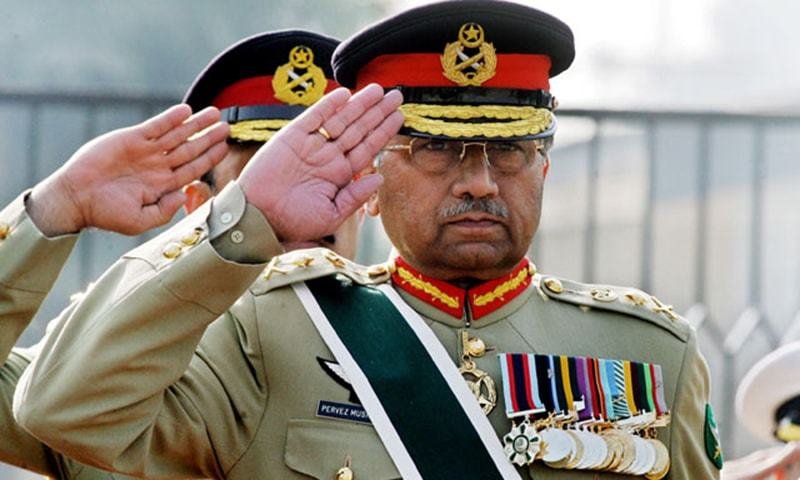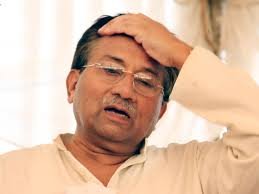
Herald Report
Islamabad: A special court Tuesday handed death sentence to former military dictator Gen (retd) Pervez Musharraf in a high treason case under Article 6 of the Constitution, media reports said.
The punishment for high treason is death or life imprisonment, according to the High Treason (Punishment) Act, 1973.
“Any person who abrogates or subverts or suspends or hold in abeyance, or attempts or conspires to abrogate or subvert or suspend or hold in abeyance the Constitution by use of force or show force or by any other unconstitutional means shall be guilty of high treason,” the Article 6 says.
This is the first time in Pakistan’s history that a former military chief has been declared guilty of high treason and handed death sentence. The verdict was split 2-1, said reports.
A three-judge bench of the Special Court headed by Peshawar High Court Chief Justice Waqar Seth with Sindh High Court Justice Nazar Akbar and Lahore High Court’s Justice Shahid Karim as its members announced the verdict in the long-drawn high treason case against Musharraf after hearing final arguments today.
The verdict was to be announced earlier in November but due to the Interior Ministry and Attorney General’s recommendations and the need for the prosecution to present more arguments the verdict was delayed.
Subsequently, on November 27, the IHC stopped the special court from issuing its verdict and directed the government to notify a prosecution team by December 5.
On December 5, a new prosecution team appeared before the special court which adjourned proceedings till December 17, adding that it would hear arguments and announce the verdict on the same day.
At the outset of today’s hearing, the government’s prosecutor, Advocate Ali Zia Bajwa, said that they had submitted three petitions today.
“We want to make Musharraf’s facilitators and companions suspects as well.” It’s important that the trial of all suspects is held at the same time, he argued.
“Submitting such a request after three and a half years means the government doesn’t have the right intentions. Today the case was set for final arguments and now new petitions have been submitted,” remarked Justice Karim.
Justice Akbar questioned the lawyer regarding the evidence against the individuals that the government wanted to include in the case.
“The stage of investigations and [presenting] evidence has passed. Has there been a new investigation against the included suspects?” he asked, in response to which the prosecutor said that an investigation can only be carried out after the complaint is registered.
The prosecutor said that according to a 2014 petition, Shaukat Aziz had told Musharraf to impose an emergency.
Justice Akbar remarked that the prosecutor was referring to Musharraf’s petition in which the verdict has been reserved while Justice Karim added that the SC has also issued a verdict on a petition regarding other suspects.
Justice Akbar said two weeks had been earlier granted to the government to present a modified charge sheet. “As per the law, charged can be amended anytime before the verdict,” responded the prosecutor.
“If you want to further make anyone a suspect, submit a new case,” said Justice Karim, asking: “Does the government want to delay Musharraf’s trial?”
“If three individuals are made suspects, the government should also submit requests to make the former cabinet and corps commanders suspects,” he added.
Justice Karim said that without the court’s permission, indictments cannot be amended. Justice Akbar added that no formal request had been received by the court for changes to the charge-sheet.
“Without the court’s permission, no new request can be submitted,” said Justice Karim, adding: “We will not hear arguments on a request that was not formally submitted.”
“The prosecution doesn’t even know how to submit a request in the court,” remarked Justice Akbar, at which the prosecutor apologised. “Your purpose was just to get through today,” the judge noted.
Justice Karim asked how the interior secretary can amend the charge sheet without the approval of the cabinet. “Where is the approval of the federal government and the cabinet? According to a Supreme Court verdict, the federal government means the cabinet,” he said.
He added that if the government doesn’t want there to be a delay, it can submit a new request against the other suspects.
A second prosecutor, Munir Bhatti, said the former prosecutor had hidden facts from the court. In October, the special court was informed that the government had sacked the entire prosecution team engaged by the previous PML-N government to prosecute the high treason case against Musharraf.
“What action has the government taken against the former prosecutor?” asked Justice Akbar.
Justice Karim said with regards to the federal government, the apex court has issued directives in the Mustafa Impex case. “After the Supreme Court’s directive is issued, the federal cabinet can make a decision, not the interior secretary,” he said.
In the Mustafa Impex case, the Supreme Court had ultimately struck down notifications that were not issued with the approval of the cabinet.
It is pertinent to mention that the special court last month had also reserved its verdict in the long-drawn high treason case. However, an Islamabad High Court (IHC) order on November 27 — a day before the special court was set to announce its verdict — stopped the special court from doing so after the Pakistan Tehreek-i-Insaf (PTI) government sought deferment of the announcement of the verdict.
Musharraf’s counsel Advocate Raza Bashir said he had submitted a request to record his client’s statement via Section 342 of the CrPC, adding that his client should be given the right to a fair trial.
“Supreme Court had ended the right to record his statement via Section 342,” Justice Akbar responded, adding that the former president had wasted six opportunities to record his statement via the CrPC.
“Musharraf should get a right to defend,” said Bashir.
“You and the prosecution are serving as his defence,” remarked Justice Akbar, noting that the court had said Musharraf could be presented at any time.
Musharraf’s counsel said his client’s health was not well enough for him to appear before the court.
“How can I defend Musharraf without Section 342 statement?” he asked.
Justice Seth said that if he is unable to defend his client, it means that his arguments have concluded.
Bashir asked for 15 to 20 days to get Musharraf’s statements recorded.
Justice Seth said that they will review the petition for the formation of the commission to record Musharraf’s statements via Section 342, and then the judges left the courtroom for their chambers.
Earlier in the day, the Lahore High Court (LHC) took up Musharraf’s petition against the special court hearing the high treason case against him as well as his civil miscellaneous application that urged the high court to halt the treason proceedings.
Justice Syed Mazahar Akbar Ali Naqvi sent the file regarding Musharraf’s case to the high court chief justice, recommending that a full bench be formed.
On Monday, the LHC issued a notice to the federal government to submit a written reply on Musharraf’s application in which he asked the high court to declare the proceedings pending before the special court and all actions against him — from initiation of the high treason complaint to the appointment of the prosecutor and constitution of the trial court — as unconstitutional.
The court had decided that it would hear the application today alongside the main petition submitted against the treason case proceedings.
During today’s proceedings, Additional Attorney General Chaudhry Ishtiaq A. Khan appeared in court on the government’s behalf while Khawaja Ahmad Tariq Raheem and Azhar Siddique represented Musharraf.
The court asked how the LHC could hear the petitions if the petitioner is a resident of Islamabad and asked for an example of another case on the basis of which the high court could hear the petition. Musharraf’s counsel Siddique said this had been done in the LNG case.
The court also asked if the high treason case against Musharraf would be heard in Islamabad today, in response to which AAG Khan said the special court will hear the high treason case and has also said it will announce the verdict today.
“Till the suspect’s statement is not recorded under Section 342 [of the Criminal Procedure Code], how can that happen?” the judge asked.
On Saturday, in an application filed through advocates Khawaja Ahmad Tariq Raheem and Azhar Siddique, Musharraf had asked the LHC to stay the trial at the special court until his earlier petition pending adjudication by the high court is decided. In that petition, the former dictator had challenged the formation of a special court holding his trial under charges of high treason and legal flaws committed in the procedure.
The government’s case was being presented by Advocate Ali Zia Bajwa.
Bajwa had urged before the bench to change the verdict but the court refused to do so. He then added that Musharraf’s prime minister Shaukat Aziz and then SC chief justice Abdul Hameed Dogar and then law minister Zahid Hamid should also be tried as aiders and abettors and given the same treatment as him. The bench gave the prosecution two weeks to come up with a new charge sheet.
Musharraf’s counsel Raza Bashir asked for 15 to 20 days to record the former president’s statement but the bench refused, saying that they had already given the former president six opportunities to do so.
A detailed verdict will be issued in two days.
The former military chief is currently in Dubai. His team can appeal the verdict in the Supreme Court.
The case was registered in December 2013 by the Pakistan Muslim League-Nawaz (PML-N) against Musharraf for the imposition of Emergency Rule on November 3, 2007. Musharraf was indicted on March 31, 2014. However, due to litigation at appellate forums, the trial of the former military dictator lingered on and he left Pakistan in March 2016.
The special court was reformed six times during the course of the trial.
After the IHC had halted the special court from delivering its judgment last month, the members of the three-judge court were of the view that the IHC’s order was not binding on them.
The IHC, however, ruled that its order of stopping the special court from announcing its verdict in the treason case was binding on it (special court) regardless of the fact that it comprises three high court judges.
The IHC in the written order stated: “A plain reading of the Act of 1976 [The Criminal Law Amendment (Special Court) Act] unambiguously shows that the Federal Government and the prosecution have a pivotal role. The trial proceedings under the Act of 1976, from initiation until the conclusion, are dependent on the presence of the prosecution appointed by the Federal Government…The Special Court cannot, therefore, pronounce the judgment without affording a reasonable opportunity of hearing to the appointed prosecutor.”
According to the IHC order, the Act of 1976 reads as a whole unequivocally makes it obvious that the trial proceedings are entirely dependent on the prosecution and that in its absence or without hearing it, judgment cannot be announced.

The High Asia Herald is a member of High Asia Media Group — a window to High Asia and Central Asia

